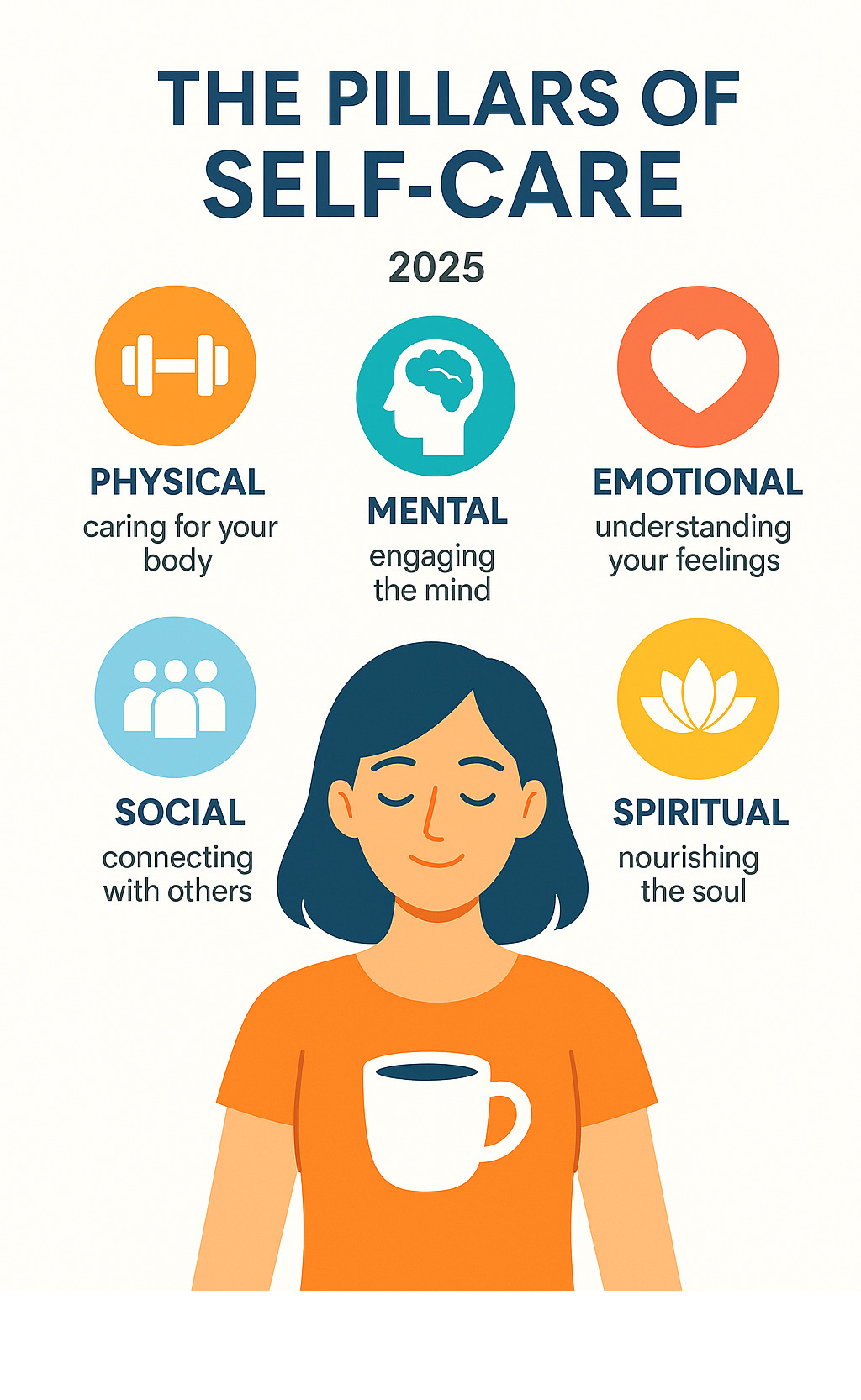What is Good Self-Care?
Good self care means taking active, intentional steps to nurture your well-being. It’s about making your physical and mental health a top priority. In today’s world, it’s easy to get caught up in the daily rush and forget to take care of yourself. But self-care is not selfish; it’s a necessary practice that helps you thrive and be your best.
Here’s a quick look at what good self-care includes:
- Physical: Making sure your body gets what it needs – enough sleep, healthy food, water, and movement.
- Mental: Keeping your mind sharp and calm through learning, puzzles, or quiet reflection.
- Emotional: Understanding and managing your feelings in healthy ways, like setting boundaries or expressing yourself.
- Social: Building and keeping strong, positive connections with friends, family, and your community.
- Spiritual: Finding meaning and purpose in your life, whether through nature, meditation, or personal values.
Self-care became a very popular topic in 2020, showing how much people needed to focus on their well-being. It’s a growing trend because it truly helps prevent burnout and improves your overall quality of life.

Basic good self care terms:
Why Self-Care is Non-Negotiable for Your Well-Being

When life gets hectic, self-care is often the first thing we skip. But good self care isn’t a luxury; it’s the foundation that helps you handle everything else. Think of it like charging your phone-you can’t run on empty. Consistent self-care is crucial for stress reduction and burnout prevention. Science backs this up: research shows that stress puts people at higher risk of developing depression and anxiety, making self-care essential for mental health. Prioritizing your well-being builds resilience, helping you bounce back from life’s challenges. This creates a positive ripple effect, leading to an improved mood and increased energy, making everything in life easier to manage.
The Mental and Physical Benefits of Good Self-Care
The great thing about good self care is how it benefits both mind and body. Since they’re deeply connected, nurturing one supports the other. Mentally, self-care brings mental clarity and better emotional regulation, equipping you to handle stressors with grace. Physically, it helps reduce inflammation and boosts your immune function, allowing your body to heal and maintain itself. When we feel good from self-care, we become better problem-solvers and more creative. The connection between beauty and mental health is real, starting with how we care for ourselves from the inside out.
Benefits of self-care for stress and quality of life
Holistic Wellness: The Secret to Long-Lasting Beauty
Self-Care as a Foundation for a Balanced Life
Good self care is the foundation for a balanced life. It makes achieving work-life balance feel manageable and improves your relationships. When you’re not running on empty, you have more patience and energy for loved ones, fostering healthy relationships. For those in caring professions, self-care is crucial to prevent compassion fatigue. Taking care of yourself isn’t selfish; it’s a strategic investment in your ability to pursue personal fulfillment. Research shows that social support correlates strongly with mental health, and self-care helps you maintain those vital connections.
From Burnout to Balance: One Woman’s Journey to Holistic Living
The 5 Core Dimensions of Self-Care

Self-care isn’t a single activity but a multidimensional approach touching various parts of your life. To practice good self care, it helps to understand these areas and how they work together. We’ll focus on five core dimensions that make a real difference in your well-being. Learning about them can help you find what you need to feel balanced and vibrant.
Physical Self-Care: Nourishing Your Body
Physical self-care means listening to your body and giving it proper fuel and rest. Prioritize sleep hygiene by aiming for 7-9 hours of quality sleep, which can significantly boost focus and mood. Fuel your body with a balanced diet and stay hydrated with plenty of water for a natural energy boost. Incorporate regular movement, like a short walk or simple stretches, to release endorphins and build confidence. Finally, rest includes taking breaks when you’re sick and allowing your body time to recover.
The Power of Breathwork for Wellness and Inner Glow
Mental Self-Care: Stimulating Your Mind
Mental self-care keeps your mind active and peaceful. Practices like mindfulness through meditation or deep breathing can reduce stress and improve well-being. Engage in lifelong learning by picking up a new skill or reading a book. Creative hobbies like drawing or music can boost dopamine and ease anxiety. Take a digital detox by unplugging from screens to clear mental clutter. Finally, keep your mind sharp with puzzles or brain games.
How to Improve Mental Health
Developing a growth mindset
Emotional Self-Care: Honoring Your Feelings
Emotional good self care involves recognizing and healthily expressing your feelings to find inner peace. Journaling helps process emotions and gain clarity. Setting boundaries by saying “no” protects your energy and prevents burnout. Practice self-compassion by treating yourself with kindness, especially during tough times. Find ways for the healthy expression of feelings, like talking to a friend or engaging in creative outlets. Finally, seek support when needed-it’s a sign of strength.
NIH emotional health toolkit
MedlinePlus: How to Improve Mental Health
Social Self-Care: Cultivating Connection
As humans, we are wired for connection. Social self-care is about nurturing connections that nourish your soul. Actively nurture relationships with loved ones through quality time. Consider community involvement by joining clubs or volunteering to expand your social circle and sense of belonging. Asking for help when you need it strengthens bonds. It’s also vital to set social boundaries by limiting time with draining people or situations to protect your well-being.
Spiritual Self-Care: Connecting with Your Purpose
Spiritual self-care is a personal journey of finding meaning and purpose. Meditation can bring calm and reduce anxiety. Spending time in nature is another powerful way to connect, lower stress, and improve your mood. A daily gratitude practice can shift your focus to the positive. Finally, aligning with your personal values by engaging in meaningful activities fosters a deep sense of purpose and fulfillment.
Morning Wellness Rituals That Set the Tone for a Beautiful Day
25+ Practical Good Self-Care Ideas for a Busy Life
We often imagine self-care as lavish or expensive, but good self care doesn’t have to be. The most restorative habits are accessible and fit into our daily lives. The key is finding practices that resonate with you. Here are practical ideas, categorized by time commitment, that you can start today.
Wellness Tools We Swear By: A Curated List for Everyday Use
Quick Resets (1-5 Minutes)
Even on our busiest days, we can find a few minutes to reset and recharge. These small acts can make a big difference in our mood and energy levels.
- Deep Breathing: Take 3-5 deep breaths, focusing on inhaling slowly through your nose and exhaling fully through your mouth. Try the 4-7-8 technique: inhale for 4 counts, hold for 7, exhale for 8.
- Hydrating with a Glass of Water: Keep a glass of water nearby and drink it mindfully. It’s a simple way to hydrate and refresh.
- A Quick Stretch at Your Desk: Do some simple stretches for your neck, shoulders, and back to release tension.
- Saying a Positive Affirmation: Choose a mantra like “I am calm and capable” or “I am worthy of care” and repeat it to yourself a few times.
- Listening to One Favorite Song: Put on a song that instantly lifts your spirits and let the music transport you for a few minutes.
5-Minute Wellness Tips for Busy Women
Mindful Moments (10-30 Minutes)
When we have a bit more time, we can engage in activities that foster mindfulness and deeper connection with ourselves.
- Taking a Walk Outside: Step outside for a brisk walk. Spending time in nature, even a city park, can lower cortisol levels and improve our mood.
- Journaling Your Thoughts: Dedicate 10-15 minutes to writing in a journal. It helps clear your mind and process emotions.
- Reading a Chapter of a Book: Immerse yourself in a good book. Reading allows us to leave our own thoughts and enter an entirely new world.
- Meditating: Use a guided meditation app or simply sit in silence, focusing on your breath. Even 10 minutes can bring a sense of calm.
- Tidying One Small Space: Decluttering a drawer, organizing your desk, or making your bed can bring a surprising sense of peace and control.
- Practicing a Hobby: Engage in a beloved hobby like coloring, sketching, or playing a musical instrument. Hobbies are linked to better mental health and lower levels of depression.
Deeper Dives (1 Hour or More)
For those times when we can truly dedicate ourselves to replenishment, these activities offer profound restoration.
- Cooking a Nourishing Meal: Spend an hour in the kitchen preparing a healthy, delicious meal. The process can be meditative, and the result is nourishing for both body and soul.
- Taking a Long Bath or Shower: Indulge in a warm bath with essential oils or a long, steamy shower. It’s a simple way to relax and wash away the day’s stresses.
- A Workout Class: Join a yoga class, dance session, or hit the gym for a longer workout. Physical activity is a powerful stress reliever and mood booster.
- Uninterrupted Time with a Friend or Partner: Dedicate an hour or more to genuine connection with a loved one, free from distractions.
- Visiting a Park or Museum: Explore a new place or revisit a favorite. Engaging with art, history, or nature can be incredibly inspiring and calming.
Self-Care Sundays: How to Replenish Your Body and Mind
Creating Your Personalized Self-Care Plan
The secret to good self care is that it’s not a one-size-fits-all routine. It’s about finding what genuinely refills your cup. Your needs shift, so an effective plan should be a flexible guide that evolves with you. The key to a lasting practice is knowing yourself and creating a routine that feels good, even if you start small. Ready to craft your personalized wellness journey? These tools can help you get started.
Self-Care Assessment worksheet
Your Monthly Self-Care Planner: Printable Wellness Tracker
Step 1: Assess Your Current Needs
First, take an honest look at where you are now through gentle self-reflection. Ask yourself: “When do I feel my best?” “What simple things make me smile?” and most importantly, “How do I want to feel?” It’s also helpful to identify your stressors-the things that consistently drain you. Then, consider if you’re neglecting any areas by thinking back to the five dimensions of self-care (physical, mental, emotional, social, spiritual). A self-care wheel can be a great tool to visually pinpoint where you’re thriving and where you might need extra attention.
Step 2: Brainstorm and Schedule Activities
With a clearer picture of your needs, list activities that bring you joy or relaxation, no matter how small. You can get inspiration from our list of 25+ ideas. Next, match those activities to your specific needs, addressing any gaps you identified in the five dimensions. For example, if emotional self-care is low, you might add journaling. The most crucial step is to schedule your self-care like a non-negotiable appointment. Put it in your calendar, even if it’s just for 15 minutes. This makes it a real priority. Remember to start small with one or two actionable steps. Consistency is more important than intensity for building lasting change.
Step 3: Tips for Building a Good Self-Care Routine
Building a sustainable good self care routine is a journey. Here are some tips:
First, overcome barriers.
- If you lack time, even 1-5 minute resets count.
- If you feel guilt, remind yourself that caring for yourself helps you show up better for others.
- If you have financial constraints, focus on the many free practices like walking or journaling.
It’s also vital to stay flexible. Life happens, so your plan should be adaptable. If you miss an activity, just adjust and try again later. Review your plan regularly to ensure it still meets your evolving needs. Most importantly, practice self-compassion. On days when you fall short, offer yourself kindness instead of criticism. Every new day is a fresh opportunity to practice good self care.
Frequently Asked Questions about Good Self-Care
It’s completely normal to have questions about self-care, especially since it’s a concept that has gained so much attention recently. Let’s tackle some of the most common thoughts and clear up any misconceptions you might have about making good self care a part of your daily life.
Is self-care selfish?
No, good self care is not selfish. This is a common misconception. When you feel your best, you have more to offer in all areas of your life-at work, with family, and in friendships. You can’t pour from an empty cup; constantly giving without replenishing your own energy leads to burnout. Prioritizing yourself ensures you have the strength to show up for yourself and others. It’s a necessary practice that benefits everyone.
How much does self-care cost?
Good self care doesn’t have to cost anything. While it’s easy to picture expensive spa days, many of the most effective practices are completely free. Simple actions like deep breathing, walking in nature, journaling, getting enough sleep, or practicing gratitude are powerful forms of self-care that don’t require any financial investment. You can build a nourishing routine on any budget. The real investment is your time and intention.
When should I seek professional help?
While good self care is vital, it’s not a substitute for professional help when needed. Self-care helps manage daily stress, but some challenges require extra support. Consider seeking help from a therapist or doctor if you’re consistently struggling to cope, if your mental health is significantly impacting your life, or if your usual self-care practices aren’t providing relief. If you experience persistent sadness, hopelessness, overwhelming anxiety, or thoughts of self-harm, please reach out. Recognizing when you need professional support is a profound act of self-care and a sign of strength.
Caring for Your Mental Health
Conclusion
We’ve explored how good self care is more than a buzzword-it’s a game-changer for your well-being. It’s not a luxury but a non-negotiable part of a healthy, balanced life. Think of it as your personal superpower, helping you stay resilient and shine as your best self.
Your self-care journey is uniquely yours, and your needs will change. The most important thing is to just start. Begin with small, simple steps; consistency, not perfection, is key. Even tiny acts of good self care add up over time. Be kind to yourself on off days-that’s okay!
Here at Beyond Beauty Lab, we believe real beauty glows from within, nurtured by caring for your whole self. We’re passionate about providing tools to boost your wellness knowledge. Go ahead and accept the power of good self care. Make it a cherished part of your everyday life.
Explore The Ultimate Guide to Wellness and Well-Being to continue your journey








